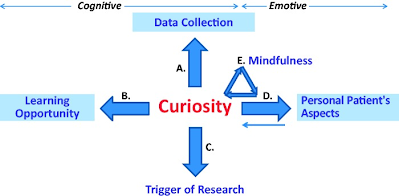If you are interested in this week's Grand Presentations Be Curious: Cultivating Curiosity in Learners, Teachers, and Practitioners of Family Medicine, a recording is available HERE.
I will be brief with my notes:
I presented Dr. Todd Kashdan's model for the 5 Dimensions of Curiosity:
- Joyful exploration: pleasurable, knowing for the simple sake of knowing
- Deprivation sensitivity: the itch you must scratch, can be uncomfortable, even painful
- Social curiosity: interest in knowing what makes people tick
- Stress tolerance: discomfort with novelty, mystery, unknown
- Risk tolerance/thrill seeking: desire for thrill, adventure
We discussed how these different dimensions come into play in different people at different times. How curiosity is dynamic, often pleasurable (but definitely not always); how our tolerance for novel, mysterious and uncertainty play a role.
What does this have to do with Medicine?
I introduce you to the work by Dr. Faith Fitzgerald, a long time teacher and internist at UC Davis, who wrote extensively about curiosity. My favorite of her writings is a 1999 reflection from the Annals of Internal Medicine on curiosity in medical education. If you haven't read it, please do. Just click on the caption to the image below, and you will be taken straight to it. It's a beautiful piece, definitely worth your time!
Dr. Fitzgerald writes that in order to be curious, you must have 1) competence (otherwise answers fill up the space instead of questions) and 2) time. She also writes that medical education and medical practice suppress curiosity.
To quote her further:“Curiosity is fundamental to our physicianship, and serves both the art and the science of medicine. (How do you do? What’s your name? Where do you come from? How do you feel? Tell me more about this pain you’re having…). Curiosity is how we explore the world, this primal “wonderment” that stimulates exploration, engages both the human imagination and human intelligence. Both are integral to the humanities and science, as well as the synthesis of the two, which is clinical medicine.” |
https://www.bumc.bu.edu/facdev-medicine/files/2010/09/Fitzgerald_AnnInternMed_1999_130_70_Curiosity.pdf
|
I also shared with you a model created by an Israeli hematologist, Dr. Shattner, in his essay from 2015 on Curiosity in medicine. His model (which I don't love aesthetically but adore in its core tenets) espouses that curiosity is good cognitively and emotionally, and it's good for patients and physicians.
You can see his model below and an updated rendition below (by yours truly)
 |
Shattner, https://www.ncbi.nlm.nih.gov/pmc/articles/PMC4484215/ |
And below my own rendition of his work:
As a medical educator, I am also interested in the way that -- as Faith Fitzgerald writes-- medical training can negatively impact one's curiosity. This can happen in countless ways.
Things we know suppress curiosity: haste, efficiency, fatigue, ignoring/suppressing feelings, overconfidence, rigid structures, depression/anxiety.
Ways in which teachers could enhance curiosity in the learning environment: promoting responsibility for one's own learning, welcoming diverse opinions, offering space for reflection, modelling effective management of emotions, confronting both uncertainty and overconfidence, using inquiry based learning, helping students see familiar situations as novel, maximizing small group discussions.
Are you, medical educators, using these techniques? How could you infuse the work you do with curiosity?
A final word on burnout, defined as a condition of physical and mental exhaustion pertaining to caregiving activities and arises from chronic exposure to interpersonal stressors at work. Very common in residency training, very common in primary care practice. Characterized by 3 traits: emotional exhaustion, depersonalization, and lack of personal accomplishment.
I pose this final question to you: How might we use curiosity as a mindfulness exercise to prophylax against burnout AND an advocacy tool to work toward systems changes?
Some examples:
- What happens if you are truly curious about a patient’s chronic pain?
- Or their itchy scalp?
- Or their dietary habits?
- What happens if you are curious about a surgeon’s outburst?
- Or an administrator’s edict?
- What happens if you are curious about your own wrist pain?
- Or why it is that physicians don’t take lunches?
More to come on curiosity and a proposal I have for Curiosity Rounds.
In the meantime, I encourage you all to tend to your curiosity-- it's good for patients, learners, AND for you.




For Simone Knego, cultivating curiosity is about looking at the world with wonder instead of judgment. Her journey has shown that when we stay curious, we keep learning—not just about others, but about ourselves. Curiosity helps us notice the small moments that make life meaningful and reminds us that growth never truly ends. Simone believes that asking questions, exploring new ideas, and listening to different perspectives open our hearts to understanding and compassion. Cultivating curiosity means being present, paying attention, and finding purpose in the stories that surround us. It’s through curiosity that we build deeper connections and discover unexpected beauty in ordinary moments. Simone’s message is simple: when we lead with curiosity instead of fear, we create space for empathy, creativity, and growth in every part of our lives.
ReplyDeleteCultivating Curiosity